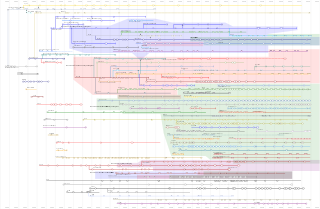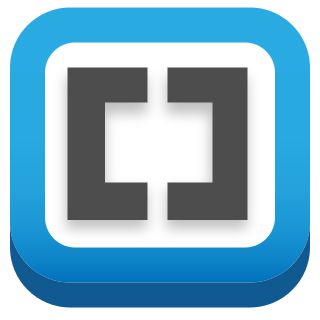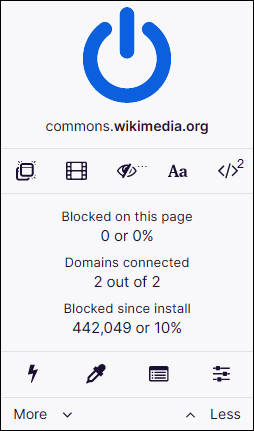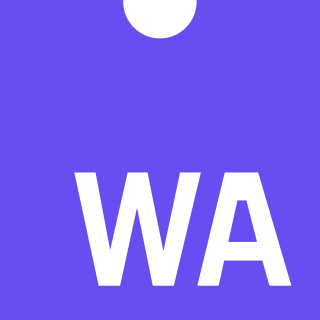
A browser war is a competition for dominance in the usage share of web browsers. The "first browser war" (1995–2001) consisted of Internet Explorer and Netscape Navigator, and the "second browser war" (2004-2017) between Internet Explorer, Firefox, and Google Chrome.
Animated Portable Network Graphics (APNG) is a file format which extends the Portable Network Graphics (PNG) specification to permit animated images that work similarly to animated GIF files, while supporting 24 or 48-bit images and full alpha transparency not available for GIFs. It also retains backward compatibility with non-animated PNG files.
This is a comparison of both historical and current web browsers based on developer, engine, platform(s), releases, license, and cost.
A browser extension is a software module for customizing a web browser. Browsers typically allow users to install a variety of extensions, including user interface modifications, cookie management, ad blocking, and the custom scripting and styling of web pages.

DownThemAll! (DTA) is a free and open source download manager browser extension. DTA can download all or some linked files, images, or embedded objects associated with a web page. It can pause, resume, or restart downloads.

Google Chrome is a web browser developed by Google. It was first released in 2008 for Microsoft Windows, built with free software components from Apple WebKit and Mozilla Firefox. Versions were later released for Linux, macOS, iOS, and also for Android, where it is the default browser. The browser is also the main component of ChromeOS, where it serves as the platform for web applications.
V8 is a JavaScript and WebAssembly engine developed by Google for its Chrome browser. V8 is free and open-source software that is part of the Chromium project and also used separately in non-browser contexts, notably the Node.js runtime system.
Google Native Client (NaCl) is a discontinued sandboxing technology for running either a subset of Intel x86, ARM, or MIPS native code, or a portable executable, in a sandbox. It allows safely running native code from a web browser, independent of the user operating system, allowing web apps to run at near-native speeds, which aligns with Google's plans for ChromeOS. It may also be used for securing browser plugins, and parts of other applications or full applications such as ZeroVM.

SRWare Iron is a Chromium-based web browser developed by the German company SRWare. It primarily aims to eliminate usage tracking and other privacy-compromising functionality that the Google Chrome browser includes. Iron ships with certain Chromium privacy options switched on by default, it provides some additional features that distinguish it from Google Chrome.

Chromium is a free and open-source web browser project, primarily developed and maintained by Google. It is a widely-used codebase, providing the vast majority of code for Google Chrome and many other browsers, including Microsoft Edge, Samsung Internet, and Opera. The code is also used by several app frameworks.
Content Security Policy (CSP) is a computer security standard introduced to prevent cross-site scripting (XSS), clickjacking and other code injection attacks resulting from execution of malicious content in the trusted web page context. It is a Candidate Recommendation of the W3C working group on Web Application Security, widely supported by modern web browsers. CSP provides a standard method for website owners to declare approved origins of content that browsers should be allowed to load on that website—covered types are JavaScript, CSS, HTML frames, web workers, fonts, images, embeddable objects such as Java applets, ActiveX, audio and video files, and other HTML5 features.

The Chromium Embedded Framework (CEF) is an open-source software framework for embedding a Chromium web browser within another application. This enables developers to add web browsing functionality to their application, as well as the ability to use HTML, CSS, and JavaScript to create the application's user interface.

Brackets is a source code editor with a primary focus on web development. Created by Adobe Inc., it is free and open-source software licensed under the MIT License, and is currently maintained on GitHub by open-source developers. It is written in JavaScript, HTML and CSS. Brackets is cross-platform, available for macOS, Windows, and most Linux distributions. The main purpose of Brackets is its live HTML, CSS and JavaScript editing functionality.
A headless browser is a web browser without a graphical user interface.

uBlock Origin is a free and open-source browser extension for content filtering, including ad blocking. The extension is available for Chrome, Chromium, Edge, Firefox, Brave, Opera, Pale Moon, as well as versions of Safari before 13. uBlock Origin has received praise from technology websites and is reported to be much less memory-intensive than other extensions with similar functionality. uBlock Origin's stated purpose is to give users the means to enforce their own (content-filtering) choices.

WebAssembly defines a portable binary-code format and a corresponding text format for executable programs as well as software interfaces for facilitating interactions between such programs and their host environment.

Cub Linux was a computer operating system designed to mimic the desktop appearance and functionality of ChromeOS. It was based on Ubuntu Linux LTS 14.04 "Trusty Tahr". It used Openbox as the window manager and tools taken from LXDE, Gnome, XFCE as well as a number of other utilities. It was a cloud-centric operating system that was heavily focused on the Chromium Browser. Cub Linux's tagline was "Cub = Chromium + Ubuntu".

KeePassXC is a free and open-source password manager. It started as a community fork of KeePassX.
JPEG XL is a royalty-free raster-graphics file format that supports both lossy and lossless compression. It is designed to outperform existing raster formats and thus become their universal replacement.
ungoogled-chromium is a free and open-source variant of the Chromium web browser that removes all Google-specific web services. It achieves this with a series of patches applied to the Chromium codebase during the compilation process. The result is functionally similar to regular Chromium.









